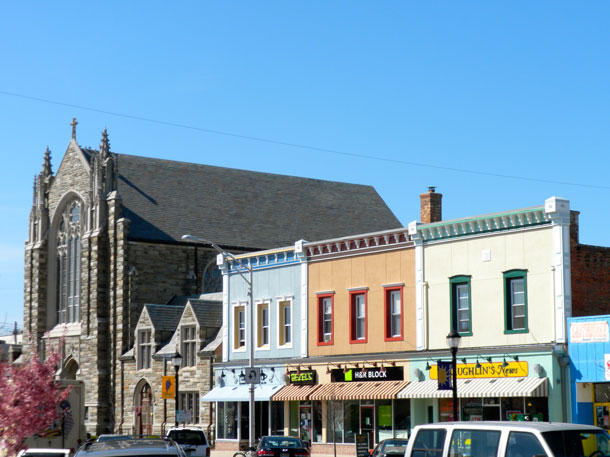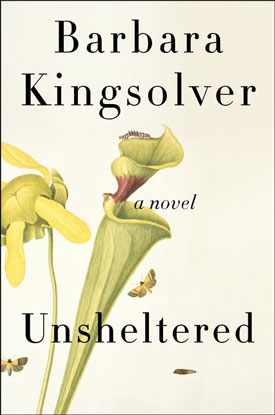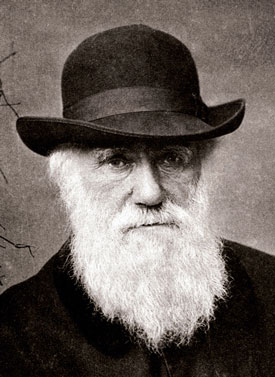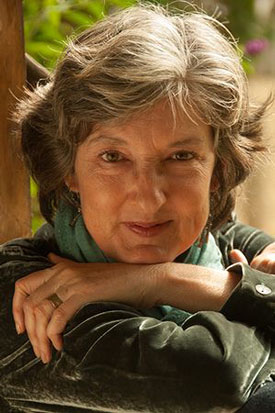Barbara Kingsolver, Unsheltered
Air Date: Week of October 19, 2018

A downtown view of Vineland, New Jersey, taken from Landis Ave. (Photo: Wikimedia Commons, Public Domain)
Writer Barbara Kingsolver has just released her ninth novel, titled Unsheltered. The novel tells the story of one family’s crisis in modern America, and the tribulations of another family that lived in the same house in South New Jersey more than a century ago. The social and environmental issues presented in Unsheltered include economic crises and the denial of science, and resonate with America’s past and present realities. Barbara Kingsolver joins Host Steve Curwood for a discussion about her latest novel, which was six years in the making.
Transcript
CURWOOD: It’s Living on Earth. I’m Steve Curwood.
The more things change the more they stay the same, goes the French aphorism, and popular author Barbara Kingsolver has a brilliant take on these unsettling times in her new novel Unsheltered. It’s a creative look at a family’s crisis in modern America, layered over the narrative of a story that unfolded in the same New Jersey town over a century earlier. Vineland, New Jersey, was first settled in the late 1800’s as a utopian experiment and the social issues there, as imagined in Barbara Kingsolver’s book, Unsheltered resonate equally with America’s reality back then and today. She joins us now, welcome back to Living on Earth!
KINGSOLVER: Hi, thanks for having me.
CURWOOD: Barbara Kingsolver, this is your first novel in, what, six years? So, what brought you the idea of writing what became Unsheltered now?
KINGSOLVER: Well, it's one of those books that took a while to cook. I spent several years thinking about how to write about paradigm shift. That's what I think we're doing right now. I think we're in the moment when so many things that we've always believed in as truths unquestionable are suddenly starting to feel not true anymore. It's a moment that feels like crisis, like the end of the world as we know it. And when I say permanent truths, things like, well, like there will always be a job at the end of the college degree or tenure at the end of the track or a pension at the end of a career or good health care or even things like ice on the poles that will stay frozen, or that there will always be more fish in the sea. We're reaching a moment in history when all those shelters are failing us.
CURWOOD: So, your device, if I can use that word...
KINGSOLVER: Of course.
CURWOOD: ...is to have two families living more than a century apart in the same house.
KINGSOLVER: Right, and of course, it's falling down.
CURWOOD: Literally.
KINGSOLVER: It's literally falling down.
CURWOOD: And that's another thing that is in question these days. Where is it safe to live? You know the occasional hurricane or maybe there's going to be a huge forest fire or whatever. In fact, you yourself you moved from the southwest back to Virginia because you could see that there ain’t going to be too much water there in Arizona.

Modern day issues mix with tales of the past and present in Barbara Kingsolver’s Unsheltered. (Photo: HarperCollins Publishers)
KINGSOLVER: Exactly. It was already functioning kind of like a spaceship. That everything people used there needed to be brought in from the outside. And in fact, we are kind of living on a spaceship. And we've been living on it for so long, I mean, well, not in terms of human evolution but in terms of present civilization. We've been operating on the presumption that our culture and our economy can grow infinitely. Just the presumption of infinite growth has to end somewhere. And we just keep throwing more of the same old request at the world of give me more. Let's grow more. Growth and consumption are seen to be the answer to our prayers. So, what happens when it seems like you're praying the wrong prayer?
CURWOOD: So, if I were to go through the various issues that are confronting people today, aside from the fact that it does seem like things are kind of falling apart, just sort of randomly you address parenting, romance among grownups, women in science, evolution, climate, feral cats, botany, fresh local food, suicide, tenure...oh, and did I leave out Trump?
KINGSOLVER: [LAUGHS] He's not mentioned by name. Any resemblance to people living are dead, pure coincidence.
CURWOOD: I see. The lawyer told you to say that.
KINGSOLVER: I don't want to get those tweets.
CURWOOD: [LAUGHS] Now, without giving too much away, let's talk some more about the historical aspects of this book. The next door neighbor, Mary Treat, is very much a real scientist. What lured you to include Mary Treat in the story.
_BHL18107831.jpg)
While there are many fictional characters in Unsheltered, the character of Mary Treat was a real scientist. Mary Treat was particularly interested in insects and botany, as seen here in a page from her book, “Injurious Insects of the Farm and Garden.” (Photo: Wikimedia Commons via https://www.biodiversitylibrary.org, public domain)
KINGSOLVER: In the 21st century story, these are all characters of my invention living through real uncertainty. However, the characters living sort of at the corner of Sixth Street and disaster in 1875 are real. They're mostly real people. So, Mary Treat, the naturalist who is the next door neighbor who becomes a kind of a larger than life figure. She was real. She's a real person who I found fascinating to research. She really was the lightning rod for this novel that it took me to Vineland. As I said, I was thinking for a couple of years about how to get into this big question about how people behave in times of crisis, and I had chosen...I knew that I wanted to set it in two different centuries and my historical story around the time of the release of Darwin's two books. Which just pretty much blew everybody's mind, not generally in a good way, mostly for the worse. It was really unsettling, powerfully disorienting for people to encounter the proposition that possibly humans were not put here to rule the Earth, that we actually are part of the Earth. It was really hard for people to accept that. In fact, it's hard for people to accept that now.
So, I wanted I wanted to set the earlier part of the novel in the middle of that that moment when Darwin had released his books. And I wanted to find a champion of Darwin who lived in the US, and I looked at Darwin himself. I read a lot about his correspondence in the US. I read a lot about Asa Gray. I ran across the name Mary Treat, a woman I'd never heard mentioned before. She's not very well known. I looked a little deeper and discovered she had a really interesting life. She had lived in Vineland, this utopian community. And so I went there. I read her archives. I walked around Vineland and discovered that's the place that's exactly the place I wanted to set this book.
CURWOOD: Not to mention that she was a woman in science who did a great job, that went largely unrecognized. She had this personal correspondence with Charles Darwin.
KINGSOLVER: Nobody knows about her. She wrote a lot about nature for people who are not scientists. A lot of her work was published in The Atlantic Monthly and Harper's. So, she was this polymath. She was this really interesting woman who could talk to people at every level from Charles Darwin to the ladies botany club that she founded in her town. So, she had this I like to think of as a particularly womanly capacity to be accessible, to really make her science comprehensible.
CURWOOD: You know what? The way you tell her story reminds me of the story of Barbara McClintock right? She gets a Nobel Prize in physiology and yet she wasn't taken seriously for what she did with genes and corn and all that and she had to stop publishing at one point. So, I have a question for you along these lines about how women are both ignored in the work that they do, but also in the education. How different do you think the American discussion about climate change, climate disruption today, would be if in fact women over time had been well integrated into science and technology and such?

Famed naturalist, biologist Charles Darwin’s Theory of Evolution is at the center of controversy in the 29th century narrative of Kingsolver’s new book. (Photo: Wikimedia Commons By Elliott & Fry, Corbis Images, Public Domain)
KINGSOLVER: Well, that's a fascinating theoretical question, and I can't really imagine how I would answer it in any scientific way because there's no control group, there's no alternate universe where women were allowed to be scientists freely, but I think so much about Rachel Carson. She's a person I really admire. The first person in the United States to speak beyond scientific circles to everyday people. If you look at Silent Spring, it's an amazing document. It was a best selling work of nonfiction. It was very readable, very accessible and the years of its publication and if you look in that book, it has chemical formulas in it, it has drawings of carbon atoms and I think who would do this? This woman, this brilliant woman who had the moxie to say, yeah, I understand science and I think everybody else can understand this, too. I just have to take the time to respect the lay reader, to respect every day people, and, yeah, we need more Rachel Carsons.
CURWOOD: Or Mary Treats.
KINGSOLVER: Or Mary Treats.
CURWOOD: Or Barbara McClintocks. Or Barbara Kingsolvers.
KINGSOLVER: If you can't do it in science, do it in a novel. And I am lucky because I was trained as a scientist. I got my undergraduate and graduate degrees in biology, evolutionary biology and ecology. And then I became an novelist, and it's really fantastic to have all this material that I learned as a scientist that I can bring into the genre of fiction because I think it's very non-threatening. I think that a lot of people who might not think they were interested or might be intimidated to read a book, a scientific book, about some of these things I write about are less intimidated by a book that conveys this information through characters.

Barbara Kingsolver is the author of nine novels; her latest is Unsheltered. (Photo: Annie Griffiths and HarperCollins Publishers)
CURWOOD: So, how did your method in writing this novel change before and then after the 2016 election?
KINGSOLVER: You know, it didn't. And it's fascinating because I had begun writing, I plotted out the novel as the primaries started to happen, and so the characters are watching this very surprising almost unbelievable leadership style coming up on the horizon. It's hard to take seriously and yet he doesn't go away, and at some point, he even says something about I could shoot people on Fifth Avenue and I would still have loyal followers. OK, at the same time I'm writing my 19th century story, and so in Vineland when people are really afraid there's this guy named Charles Landis who's their, their founder who owns the newspaper and every business in town. He kind of owns everything, and he's kind of a big bully and he is real, he was a real historic personage, and I'm researching him and I discover he actually did shoot someone on Main Street and he got away with it. So, I thought it's just too good and too awful to be true. If this stuff really bears out I guess I'm launching this novel into a world that needs to read it.
CURWOOD: You frame Unsheltered as a way to talk about paradigm shifts. So, from all this research and your thinking, where are we headed now?
KINGSOLVER: When I look at any photograph of the leaders of my country, I see a bunch of guys in suits who formed their notion of what the world is in the 1950s and 60s, a period of US history when it really seemed like there was plenty of everything to go around. That post-war boom where you could just we could just grow forever and you can own everything. You could be the boss of everything, you really had it made, you were not going to ever have to sort of reign yourself in. I think it's actually very comforting to know that tomorrow's problems won't be solved by yesterday's people because they'll most mostly be dead. Tomorrow's problems are going to be solved by tomorrow's people, and I know a lot of young people who really inspire me who I think understand things about the world that I almost can't because they're coming up in a time when they've known since they were very small there will not always be more fish in the sea.
CURWOOD: Barbara Kingsolver's new book is called Unsheltered. Thanks so much for sharing this time with us.
KINGSOLVER: Thanks. It was great to talk with you.
Links
Living on Earth wants to hear from you!
Living on Earth
62 Calef Highway, Suite 212
Lee, NH 03861
Telephone: 617-287-4121
E-mail: comments@loe.org
Newsletter [Click here]
Donate to Living on Earth!
Living on Earth is an independent media program and relies entirely on contributions from listeners and institutions supporting public service. Please donate now to preserve an independent environmental voice.
NewsletterLiving on Earth offers a weekly delivery of the show's rundown to your mailbox. Sign up for our newsletter today!
 Sailors For The Sea: Be the change you want to sea.
Sailors For The Sea: Be the change you want to sea.
 The Grantham Foundation for the Protection of the Environment: Committed to protecting and improving the health of the global environment.
The Grantham Foundation for the Protection of the Environment: Committed to protecting and improving the health of the global environment.
 Contribute to Living on Earth and receive, as our gift to you, an archival print of one of Mark Seth Lender's extraordinary wildlife photographs. Follow the link to see Mark's current collection of photographs.
Contribute to Living on Earth and receive, as our gift to you, an archival print of one of Mark Seth Lender's extraordinary wildlife photographs. Follow the link to see Mark's current collection of photographs.
 Buy a signed copy of Mark Seth Lender's book Smeagull the Seagull & support Living on Earth
Buy a signed copy of Mark Seth Lender's book Smeagull the Seagull & support Living on Earth

